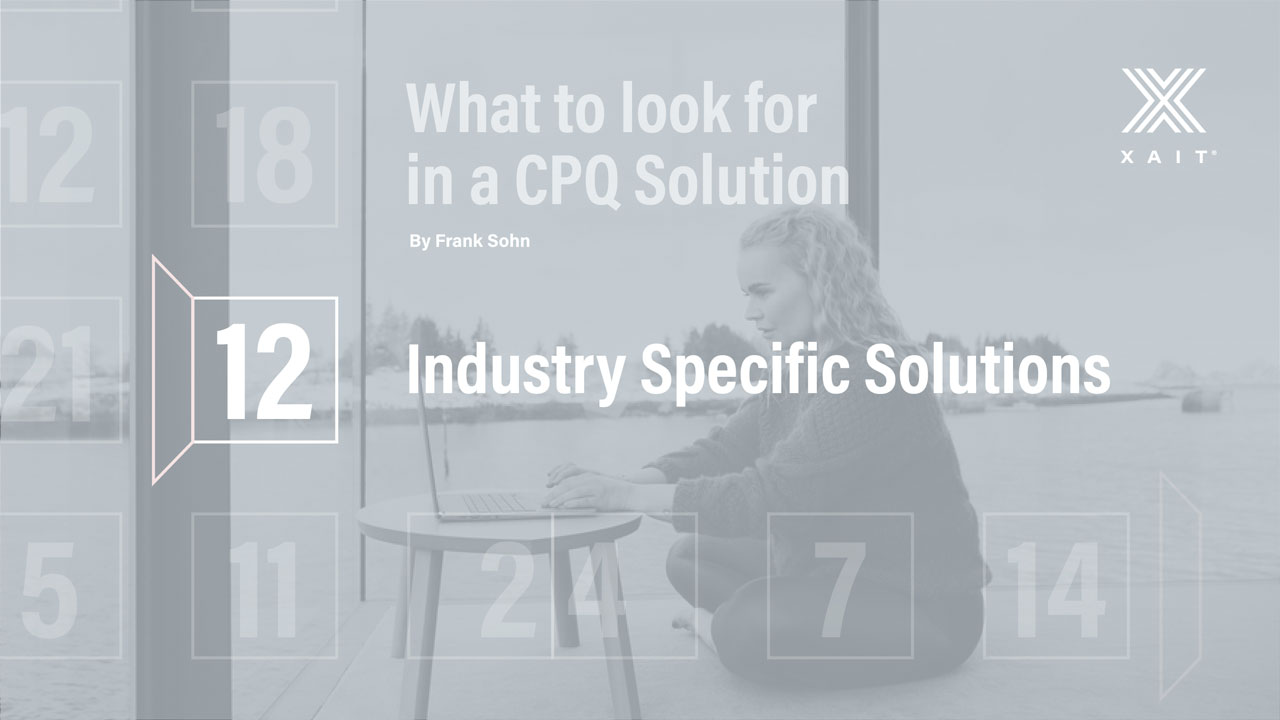
What to Look for in a CPQ Solution, Part 1: Industry-Specific Solutions
11.12.2022
-2 min

Software
LET'S TALK!
We offer software that makes you win big and ultimately gives you the work-life balance you deserve.

XaitPorter
Co-authoring and automation solution for complex documents

XaitCPQ
Quickly and accurately price combinations of interdependent products and services
XaitProposal
Guided proposal creation for comprehensive, winning proposals
XaitRFI
The smarter way to respond to RFIs, DDQs and security questionnaires
XaitWebProposal
The easiest way to create interactive and custom mini-websites

XaitAI
The X factor for analyzing and writing winning bids and proposals
Industry
OUR SOLUTIONS BY INDUSTRY
Do you have a question about your business vertical?
Resources
RESOURCES
Discover all our Xaiting resources!
About us
LET'S TALK
We can challenge mindsets and make significant changes to the way people interact

Frank Sohn
11.12.2022
-2 min

There are well over 100 different Configure, Price, Quote (CPQ) solutions available globally, and they have all been developed for many different industries and business use cases.
The first challenge in selecting a CPQ solution is usually to understand what solutions are available.
The second challenge is to understand how these CPQ solutions are different from each other. This is not a trivial task, because they may all share the same ‘CPQ’ acronym somewhere in their name or on their website, but they have been developed for many different industries, provide very different capabilities, and offer numerous different price points.
The first challenge is relatively quick to address by looking at a list of CPQ solutions (see here ). Keep in mind that this list is incomplete and that more CPQ solutions are available in different geographic locations. As an alternative or to further expand the search for CPQ solutions, one can also do extensive searches on Google, LinkedIn, Capterra, and G2.
The second challenge can be addressed by looking at key differentiators of CPQ solutions. In a three-part series for this Christmas calendar special, we will have a look at a total of five key differences:
Historically speaking, CPQ solutions, also known as Product Configuration solutions, have been developed by Manufacturing companies. That started in the 1960s, then over time capabilities like Pricing and Quoting and more have been added. These capabilities were added to standard ERP solutions since the 1990s and then to CPQ solutions since the 2010s.
Hence, most CPQ solutions are available to manufacturers, but many other industries are adopting them now for years, like High Tech, Software, Telco, Health & Life Sciences, and many others. In fact, the number of industries using CPQ is steadily increasing.
Since every industry has its own specific business requirements, it is important for every (new) CPQ customer to understand which industry (or industries) their potential CPQ vendor is specialized in. The best fit is usually there when the majority of a CPQ vendor's customers are in a specific industry.
For example, an SMB manufacturer should look for a CPQ vendor with a large customer base of SMB manufacturers. A software company should look for a CPQ vendor with a large customer base of software companies.
While it is not always obvious for a future CPQ customer to recognize in which industry a CPQ vendor is specialized, a CPQ vendor website, webinars they offer, blog posts, customer references they have, and so on are good indicators of the CPQ vendor’s industry focus.
Next in our series on what to look for in a CPQ Solution: Learn about the importance of the ability to handle complexity, and which features and functions to look for.

Frank Sohn
Originally from Germany, Frank started his CPQ experience with a SAP Project focused on Variant Configuration in Germany in 1996. He started his career as a developer in 1993 and then became an SAP Consultant in 1994. After spending a few years with small SAP consulting firms in Germany, Switzerland and the UK, he worked for multiple global high tech companies such as IBM GS, Hewlett Packard, IBM, Juniper and PWC prior to following his passion and founding his own CPQ focused consulting company. Throughout his career Frank was passionate about the customization and personalization the configuration, price, quote tools enable, and wants to help his clients to get the most value out of the CPQ processes and tools. Frank received a Bachelor of Business Information Technology degree in Germany in 1992. He is also a PMP (Project Management Professional since 2005) and a CSM (Certified SCRUM Master, since 2010).

